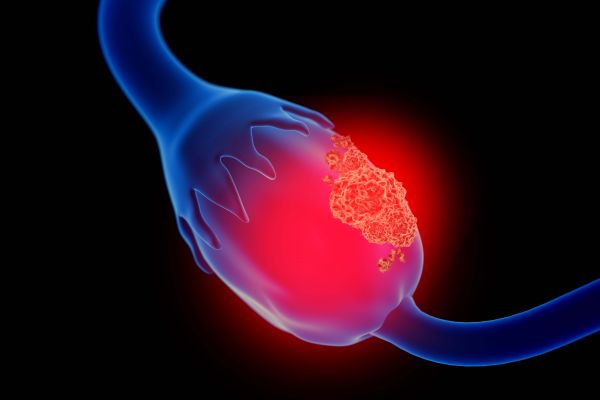Ovarian cancer is a relatively rare but deadly cancer.
The average woman’s risk of developing ovarian cancer at some point in her life is relatively small (1.4%), but some women are at higher risk than others. Women with a family history of ovarian or breast cancer, or those who carry certain gene mutations, have an increased risk. We’re now learning that other factors, such as height and weight, can affect a woman’s risk of getting ovarian cancer.
Body type and cancer risk
A Roswell Park research team led by Kirsten Moysich, PhD, MS, Distinguished Professor of Oncology, and Albina N. Minlikeeva, PhD, Postdoctoral Research Affiliate in the Department of Cancer Prevention and Control, recently studied a large group of women with ovarian cancer, along with healthy volunteers from the community, to see whether physical characteristics such as height and weight influence ovarian cancer risk.
The team found that both height and weight, as well as changes in weight over time, do in fact influence ovarian cancer risk. Women who were taller as adolescents and adults were more likely than women shorter than 5’6” to die of the disease. Women who had gained more than 20 pounds between the ages of 18 and 30 also tended to have a worse prognosis. Interestingly, women who had lost weight but then gained it back several times had a lower risk of ovarian cancer and a better prognosis.
Never miss another Cancer Talk blog!
Sign up to receive our monthly Cancer Talk e-newsletter.
Sign up!Why is it that taller, heavier women are at higher risk? “We know that excess weight is associated with inflammation, and inflammation is strongly related to cancer development,” explains Dr. Moysich. “If you eat well and maintain a healthy weight, you will reduce your body’s exposure to inflammation, which can be cancer protective. We also know that physical inactivity is related to cancer, so it’s a good idea to be active too.”
When it comes to height, hormones and growth factors might be responsible. Height is the result of exposure to growth factors, including insulin-like growth factor-I (IGF-I), which can also favor cancer development. Girls who grow quickly during adolescence have higher levels of these hormones than their shorter peers, so it is possible that these growth factors might predispose taller women to ovarian cancer or make their cancer more aggressive, even in later adulthood, when it is usually diagnosed.
“Taller women are certainly not doomed to die of ovarian cancer,” assures Dr. Moysich. “Although we know that taller women tend to have a poorer prognosis, the most important factor determining a woman’s chance of surviving ovarian cancer is stage.” The earlier cancer is diagnosed, the better.
Detection and prevention
Unfortunately, because ovarian cancer usually doesn’t cause symptoms in the early stages, a woman often doesn’t know she has this disease until the tumors have grown very large or spread from the ovaries to other parts of the body. A few symptoms can develop as the cancer advances, but these are generally nonspecific and can be confused for other conditions, such as irritable bowel syndrome. At its later stages, ovarian cancer is very difficult to treat. More than half of all women with advanced ovarian cancer will die within 5 years of the diagnosis, and many who survive this type of cancer see it come back a short while later.
Because we currently don’t have reliable ways to screen for ovarian cancer, it is important for women to understand their risk and look for the early warning signs.
Known risk factors include:
- Family history of ovarian or breast cancer
- Mutations in the BRCA1 and BRCA2 genes
- Older age
- Endometriosis
- Talcum powder use
- Infertility
Talk with your doctor if you experience any of the following symptoms for longer than 1 month:
- Bloating or swelling of the abdomen (known as ascites)
- Sudden weight loss
- A frequent need to urinate
- Pelvic discomfort
- Changes in bowel habits (such as constipation)
About the research team: In addition to Drs. Moysich and Minlikeeva, the Roswell Park team that found a link between body type and ovarian cancer included Paul Mayor, MD, and Kristen Starbuck, MD, Department of Gynecologic Oncology; John Etter, MPH, and Rikki Cannioto, PhD, Department of Cancer Prevention and Control; Brahm Segal, MD, Chief of Infectious Diseases; Shashikant Lele, MD, FACOG, Clinical Chief of Gynecologic Oncology; and Kunle Odunsi, MD, PhD, FRCOG, FACOG, Chair of the Department of Gynecologic Oncology.



